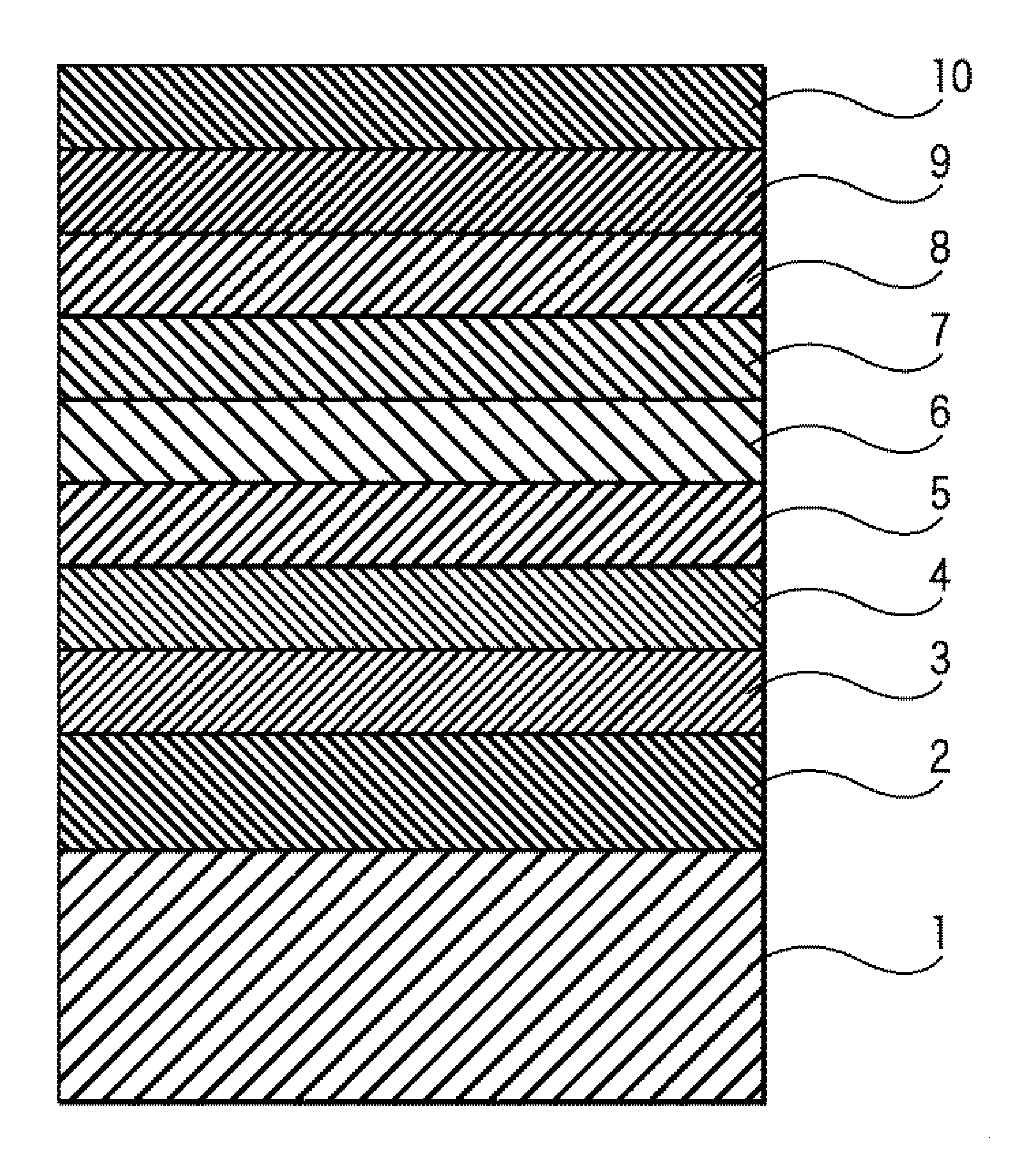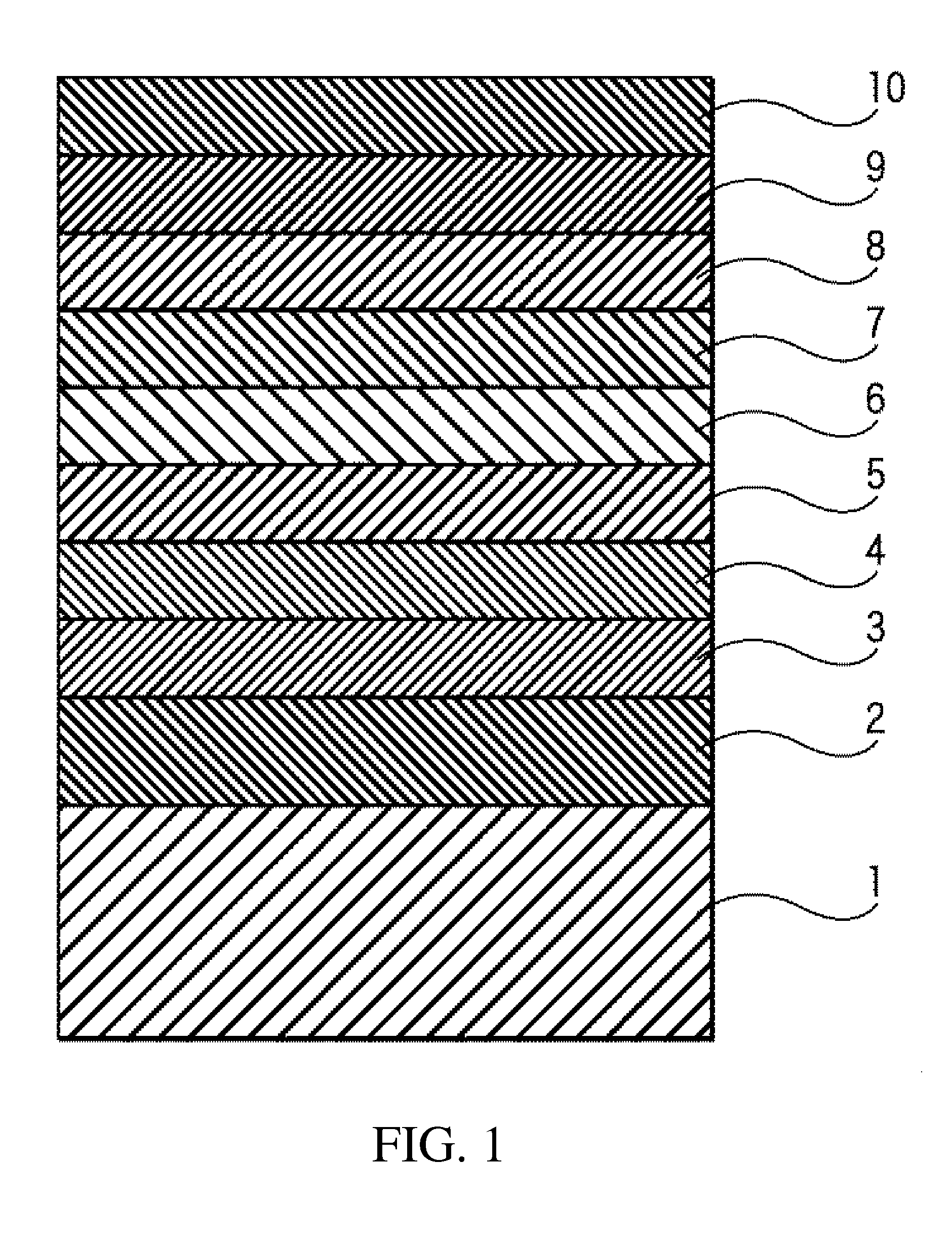Perpendicular magnetic recording medium
- Summary
- Abstract
- Description
- Claims
- Application Information
AI Technical Summary
Benefits of technology
Problems solved by technology
Method used
Image
Examples
embodiment 1
[0056]As the nonmagnetic substrate 1, an Al alloy plated with NiP and with a flat surface was used; after cleaning, the substrate was introduced into a sputtering device, and a Co—Zr—Nb target was used to deposit a CoZrNb amorphous soft magnetic backing layer 2 of thickness 40 nm. Next, a target of Ni—Fe—Si, which is a Permalloy system alloy, was used to deposit an NiFeSi underlayer 3 of thickness 10 nm. Then, a Ru target was used to deposit a Ru nonmagnetic intermediate layer 4 of thickness 10 nm. Then, a 93(Co-8Cr-20Pt)-7SiO2 target was used to deposit a granular-structure CoCrPt—SiO2 first magnetic recording layer 5 of film thickness 4 to 8 nm. Next, a Ru target was used to deposit a Ru coupling layer 6 of film thickness 0.2 nm. Then, a 93(Co-15Cr-10Pt)-7SiO2 target was used to deposit a granular-structure CoCrPt—SiO2 second magnetic recording layer 7 of film thickness 4.0 nm. Then, a 93(Co-20Cr-5Pt)-7SiO2 target was used to deposit a third magnetic recording layer 8 of film thic...
embodiment 2
[0062]Except for the fact that the CoZrNb amorphous soft magnetic backing layer 2 was not deposited, entirely the same processes as in Embodiment 1 were used to fabricate a magnetic recording medium.
embodiment 3
[0069]As the nonmagnetic substrate 1, an Al alloy plated with NiP and with a flat surface was used; after cleaning, the substrate was introduced into a sputtering device, and a Co—Zr—Nb target was used to deposit a CoZrNb amorphous soft magnetic backing layer 2 of thickness 40 nm. Next, a target of Ni—Fe—Si, which is a Permalloy system alloy, was used to deposit an NiFeSi underlayer 3 of thickness 10 nm. Then, a Ru target was used to deposit a Ru nonmagnetic intermediate layer 4 of thickness 10 nm. Then, a 93(Co-8Cr-20Pt)-7SiO2 target was used to deposit a granular-structure CoCrPt—SiO2 first magnetic recording layer 5 of film thickness 4 to 8 nm. Next, a Ru target was used to deposit a Ru coupling layer 6 of film thickness 0.2 nm. Then, a 93(Co-15Cr-10Pt)-7SiO2 target was used to deposit a granular-structure CoCrPt—SiO2 second magnetic recording layer 7 of film thickness 4.0 nm. A third magnetic recording layer 8 was not deposited, and finally, a carbon target was used to deposit a...
PUM
 Login to View More
Login to View More Abstract
Description
Claims
Application Information
 Login to View More
Login to View More - R&D
- Intellectual Property
- Life Sciences
- Materials
- Tech Scout
- Unparalleled Data Quality
- Higher Quality Content
- 60% Fewer Hallucinations
Browse by: Latest US Patents, China's latest patents, Technical Efficacy Thesaurus, Application Domain, Technology Topic, Popular Technical Reports.
© 2025 PatSnap. All rights reserved.Legal|Privacy policy|Modern Slavery Act Transparency Statement|Sitemap|About US| Contact US: help@patsnap.com



